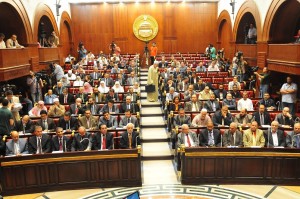KAFR EL-SHEIKH: The Kafr El-Sheikh prosecution office has ordered the release of two student activists of the April 6 Youth Movement, Sara Rezk and Omenya Taha, on bail, while a group of their supporters remained in police custody pending investigations.
Their bail was posted at LE 1,000 each. At press-time, the two women had not yet been released and at least 10 of their supporters were still in custody.
The arrest of the two women at Kafr El-Sheikh University on Wednesday had sparked a series of events, culminating with the arrest of at least 18 activists protesting the renewal of a 15-day detention order for the women on Saturday. Rezk, who is also a member of the Democratic Front Part (DFP), and Taha had been charged with distributing leaflets inciting the public to overthrow the government.
According to eye-witness reports, the arrests had been brutal, encompassing almost everyone at the scene. Nada Sadek, a representative of the DFP present during the arrests, said the square was encircled by a number of large prisoner transfer trucks, out of which emerged plainclothes State Security policemen and government-hired “thugs who proceeded to beat those standing in the crowd.
There have been unconfirmed reports from several sources that one woman miscarried as a result of the violence.
“Almost anyone who was there and who had seen anything was taken. Only about four or five got away, Sadek said. Among the arrestees was Rezk’s borther, Mahmoud.
Sadek, who had spoken to Rezk and Taha earlier, said they had been harassed and threatened with sexual assault, while Rezk had also been beaten. “The other girl was too frail, so they didn’t beat her, she said.
Protestors on Saturday had assembled in front of the court, chanting slogans and carrying signs that read “Long live Egypt and “Release Sarah and Omneya.
Those currently being investigated are facing four charges, according to Mohsen Besheer, a lawyer at the Hisham Mubarak Law Center: partaking in a group or organization with the aim of thwarting constitutional dictates, printing materials with the same aim, intentionally obstructing traffic also with the same aim, and assembling more than five people, thereby posing a danger to public order.
“These charges are standard in these types of cases, Besheer said.
Lawyers at the scene were not immune to harassment.
Ahmed Ezzat, a lawyer for the Association for Freedom of Thought and Expression, was among the lawyers present to lend his support to Rezk and Taha.
“There was a peaceful protest against the decision to renew the detention, and suddenly security forces pounced on them and began to beat them and drag them on the floor, he said, adding that lawyers were harassed and threatened with arrest when they tried to interfere.
Motasem Billah Mohamed, one of the leaders of the April 6 Youth Movement who managed to escape the arrests, had a similar account: “They were beating everyone – women, men, it didn’t matter.
Mohamed, however, was not worried about the effects of the arrests and beatings on Monday’s general strike.
“The events are going to show people how these things can happen to any one of them at any time, and will show how the government behaves towards the people with stupidity and tyranny even though the right to peaceful protest is guaranteed by the constitution, he said.
“The April 6 strike will not succeed because of the April 6 Youth Movement or the efforts of political parties or groups; it will succeed by the nation-wide participation of the people.

